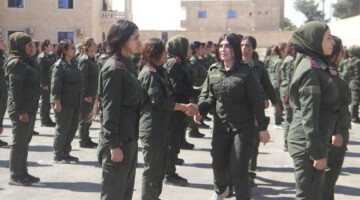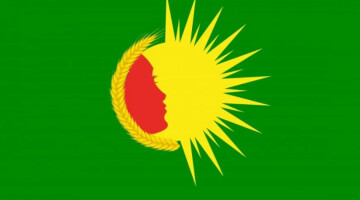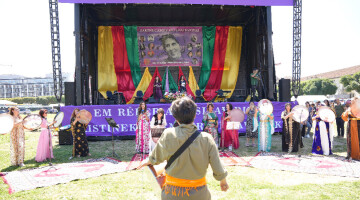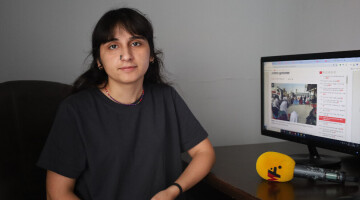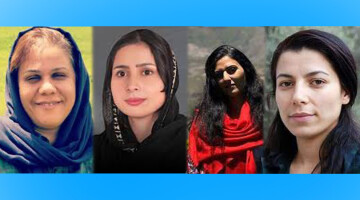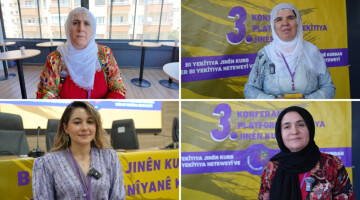The first congress of the Regional Democratic Women’s Coalition in the Middle East and North Africa (NADA), held in Sulaymaniyah, concluded with the announcement of its final declaration.
The declaration stated:
“We are currently undergoing a period of significant transformation, marked by dramatic changes in all areas and unfolding amid intense developments at both the regional and international levels. While unjust policies and practices have deepened the devastating impact of these transformations on women, they have also opened up new and significant opportunities.
In this context, the NADA Alliance held its first post-foundation congress on May 15–17, 2025, in the city of Sulaymaniyah in the Kurdistan Region of Iraq, under the slogan ‘Towards a Democratic Society Based on Women’s Revolution.’ The congress brought together hundreds of women activists, organizations, and institutions from across the Middle East and North Africa (including Palestine, Lebanon, Jordan, Egypt, Tunisia, Morocco, Somalia, Sudan, Yemen, Mauritania, Iraq and the Kurdistan Region, Turkey, Iran, Syria, and Afghanistan). The participation of women from Arab, Kurdish, Syriac, Assyrian, Armenian, Amazigh, Persian, Afghan, and Yazidi (Êzidî) communities represented the unity of women across the region’s immense cultural diversity.
A society based on women’s freedom
The congress sessions focused on core theoretical issues related to the exclusion and injustice faced by women in the Middle East. The third world war currently unfolding in the region was described as a silent genocide against women: massacres, forced displacement, abduction, and the use of women as tools of war, as seen in the atrocities committed against Yazidi women in Shengal in 2014, or in the ongoing devastation in Palestine over the past year and a half. Similar atrocities are taking place in Sudan and Yemen. These brutal wars are not only the product of democracy-deprived nation-states, but also the result of global capitalism’s alliance with local political-religious powers. These dynamics, compounded by patriarchal laws, constitutional frameworks, and regressive social values, have further marginalized women.
The congress also addressed the historical legacy of women’s resistance and their struggle to uphold this legacy amid today’s crises. Women have never stepped back; on the contrary, they have forged a powerful connection between the matriarchal culture of the past and the goals of contemporary struggle. The women’s revolutions in Rojava, Sudan, Yemen, and Tunisia, as well as the “Jin, Jiyan, Azadî” (Woman, Life, Freedom) uprising in Iran and Eastern (Rojhilat) Kurdistan, are vivid examples of this continuity. The congress emphasized that a society based on women’s freedom must be built upon a shared life rooted in equality between men and women.
Joint struggle
Participants thoroughly evaluated the current state of the women’s struggle, the challenges it faces, and the opportunities that lie ahead. The discussions emphasized the importance of seizing available resources and historical openings to strengthen efforts toward building peace and establishing a democratic society rooted in the women’s revolution. It was also stressed that regional alliances among women must be reinforced, and the need for collective resistance against patriarchal and anti-woman neoliberal coalitions was highlighted. The congress further underlined that women must have access to legal, constitutional, and security-based protection and defense mechanisms, particularly in times of war and conflict.
Seven specialized committees established
The congress emphasized that in response to the political dynamics of the third world war, it is essential to develop a unified political struggle led by women and to build global women’s networks that can carry forward the universal legacy of women. The NADA Alliance was highlighted as a driving force in continuing the passionate women’s revolution under the slogan “Jin, Jiyan, Azadî”.
On the third day of the congress, participants reviewed the past activities of the NADA Alliance, defined its strategic objectives, and established seven specialized committees to implement the alliance’s projects.
Participants reached a consensus on the following points:
- To strengthen the NADA Alliance as a comprehensive women’s platform grounded in human rights, embracing the Convention on the Elimination of All Forms of Discrimination Against Women (CEDAW), the Istanbul Convention, United Nations Security Council Resolution 1325 on Women, Peace and Security, and relevant regional protocols.
- To adopt the Rojava and North and East Syria Women’s Revolution Document and the Charter of the Global Democratic Women’s Confederation as core references of the NADA Alliance, thereby reinforcing international solidarity among women.
- To enhance women’s organization and resistance for a society based on freedom, a life shared in equality between women and men, democracy, and social justice.
- To struggle for a democratic society and peace built on individual freedom, free from extremism, and from ethnic, religious, or sectarian divisions.
- To support Abdullah Öcalan’s Call for Peace and Democratic Society, which centers on women’s freedom.
- To demand the release of women prisoners held in the jails of occupying forces and authoritarian regimes.
- To stand in solidarity with the resistance of Yazidi women and offer support for their struggle.
- To provide both national and international support to women’s resistance in the face of war, occupation, genocide, displacement, demographic engineering, and sexual violence occurring across the Middle East and North Africa, particularly in Palestine, Sudan, Syria, and Yemen.
- To establish networks among women’s organizations, promote the sharing of ideas, visions, and experiences, and address women’s issues as a transnational human cause.
- To ensure women’s active participation in political decision-making processes and to strengthen their intellectual and social capacities.
- To expand the work of the NADA Alliance through its local committees in each country and to reinforce joint actions on both local and regional levels.
- To build a women-centered, independent media that amplifies women’s issues and counters the male-dominated media narrative that degrades women.
Long live the free women’s struggle in the Middle East and North Africa!
Long live the women’s revolution! (Woman, Life, Freedom – Jin, Jiyan, Azadî)
Regional Democratic Women’s Alliance (NADA Alliance)"








